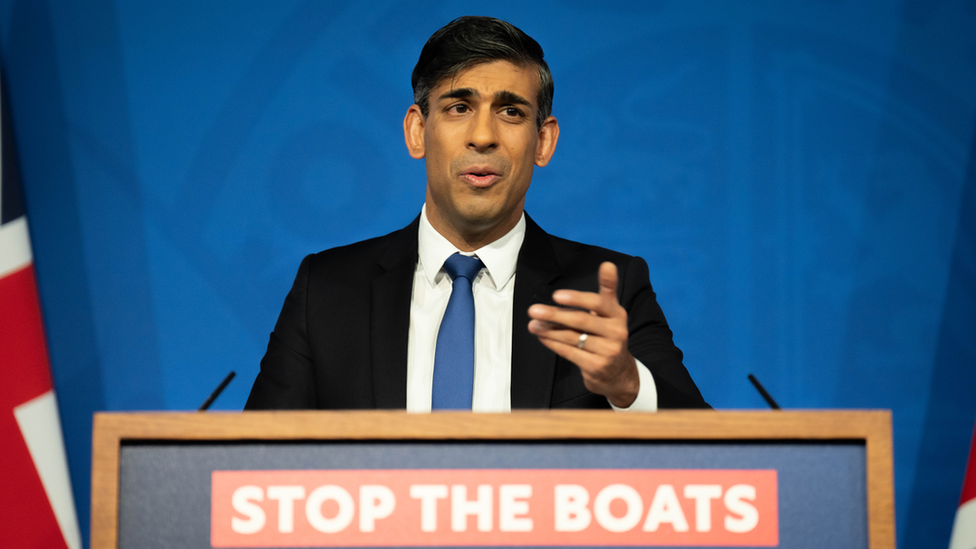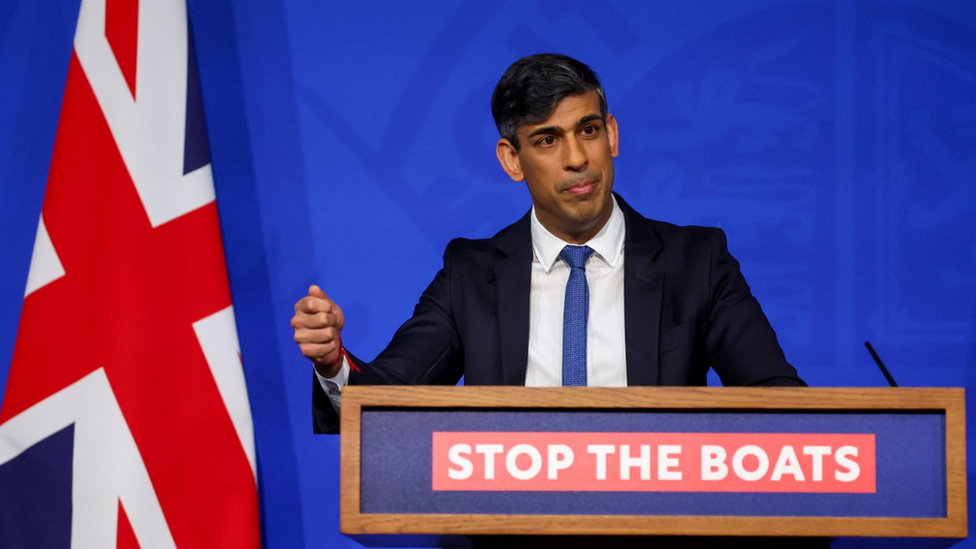Rishi Sunak denies doubting Rwanda plan when chancellor
- Published
Watch: Sunak dismisses claim he had doubts over Rwanda scheme
Rishi Sunak has said it was his job when he was chancellor to question the cost of the government's Rwanda scheme but denied doubting it could work.
Papers seen by the BBC this week suggested that in 2022 Mr Sunak wanted to scale back plans to send asylum seekers to the African nation.
The documents also indicated he was not sure the policy would be a deterrent.
Speaking to BBC One's Laura Kuenssberg on Sunday, Mr Sunak said that, as chancellor, he "scrutinised" all plans.
However, he said this did not mean he did not back the Rwanda policy, pointing out that he had funded the scheme.
"Just because someone's asking tough questions doesn't mean that they don't believe in the proposal," he said.
Under the scheme, some migrants would be sent to Rwanda for processing and potentially resettlement.
The government has argued this would discourage people from trying to get to the UK in small boats.
The scheme was first announced in April 2022 when Boris Johnson was prime minister.
However it has run into legal difficulties, with the Supreme Court ruling it was unlawful last year.
The BBC has seen No 10 documents that were prepared in March 2022 when then-PM Boris Johnson was trying to persuade Mr Sunak to sign off on funding for the plan.
The papers describe a significant difference of view between No 10 and 11 Downing Street on the effectiveness of the proposed scheme saying the chancellor believes the "deterrent won't work". One of the government's key aims was to implement a tougher policy that would put people off the idea of crossing the English Channel in small boats looking for asylum in the UK.
The documents also reveal that No 10 proposed telling Mr Sunak to "consider his popularity with the base" if he was reluctant to sign up to changes to the migration system, including the Rwanda plan.
'Probing questions'
Labour's shadow home secretary Yvette Cooper said: "These papers show total con of Tories' Rwanda plan and how incredibly weak Rishi Sunak is.
"He knew costs were extortionate and resisted as chancellor. But he's now so weak he's writing £400m cheques to Rwanda for no one to be sent."
Asked about the documents on Sunday, Mr Sunak said that he had asked "probing questions of every proposal" that crossed his desk, but added: "To infer from that that I don't believe in the scheme of the principle of deterrence is wrong."
He said the proof was "in his actions" and that as prime minister he was trying to pass legislation to put in place the Rwanda policy.
The legislation, introduced to overcome the objections of the Supreme Court, states that Rwanda should be considered a safe country under UK law.
However, Mr Sunak faced criticism from both sides of his party - with some arguing it would break international law, while others feared it would not go far enough.
After the Safety of Rwanda Bill was announced Robert Jenrick quit as immigration minister describing the legislation as a "triumph of hope over experience" and Suella Braverman, whom Mr Sunak sacked as home secretary, said the bill was "destined to fail".
The bill passed its first stage in the House of Commons with a comfortable majority, but Mr Sunak faces a battle to get it through Parliament when it returns in the coming weeks.
During his interview, Mr Sunak was also asked if he would ever ignore an order from the European Court of Human Rights to halt deportation flights.
These type of injunctions - known as Rule 39 orders - were previously used to block the removal of migrants to Rwanda in June 2022.
Mr Sunak did not directly say if he would ignore such an order but insisted he would not "let a foreign court stop our ability to remove people, once we have been through our process of parliament and our court system".
The Safety of Rwanda Bill includes a measure that says ministers can decide whether to comply with such an orders.
However, the One Nation group of Conservative MPs has urged the prime minister to "think twice before overriding" the European Court of Human Rights.
Related topics
- Published6 January 2024

- Published13 June 2024
